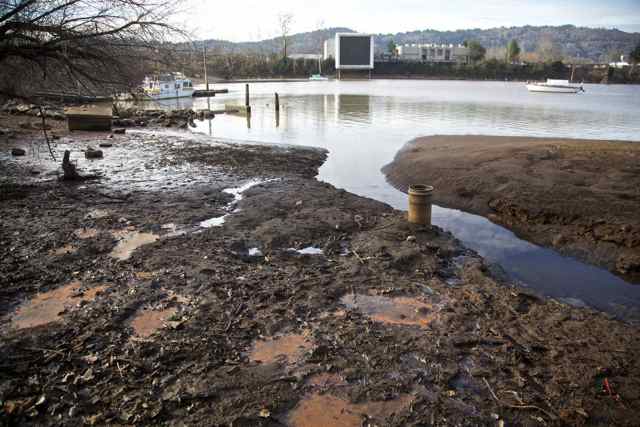forum
library
tutorial
contact

EPA Recommends 7-year,
$750M Superfund Cleanup Plan
by Andy GiegerichPortland Business Journal, June 8, 2016
|
the film forum library tutorial contact |

|
EPA Recommends 7-year,
by Andy Giegerich |
 The U.S. Environmental Protection Agency said Wednesday it would propose a combination of dredging and capping, along with a "natural recovery" technique, to clean the Willamette River's Superfund site.
The U.S. Environmental Protection Agency said Wednesday it would propose a combination of dredging and capping, along with a "natural recovery" technique, to clean the Willamette River's Superfund site.
The EPA released the proposed plan to clean up about 10 miles of the Lower Willamette River, between the Broadway Bridge and the Columbia Slough.
Pollution in the Portland Harbor includes cancer-linked polychlorinated biphenyls, pesticides and heavy metals that have taken up residence in the muck at the bottom of the Willamette River between Sauvie Island and the Fremont Bridge.
All told, EPA estimates the plan would take seven years and cost about $750 million. That's significantly lower than earlier estimates, the highest of which came in at $1.4 billion.
The lower cost stems from the EPA's decision that the best approach in less-contaminated areas is to monitor them and to allow them to recovery naturally, which would involve what the EPA's Dennis McLerran described during a news conference as the "aquatic disposal" of affected sediment.
The more invasive approach of dredging and capping would take place in areas where concentrations of contaminants are higher.
The Superfund cleanup is seen as a potential boon to the economy, in that it could lead to more jobs because businesses are more likely to establish operations in non-polluted areas on Portland's working waterfront.
"We do see economic benefits from moving forward with the proposed plan," McLerran said. "In the near term, there would be (construction) jobs and economic activity associated with the seven years of work in the river."
In the long term, he said, the clean up would create "more certainty" about the Willamette's health.
The Lower Willamette Group represents some of the "potentially responsible parties," including Gunderson Corp., Kinder Morgan and the city of Portland, which has holdings along the Superfund site. The group, which is reviewing the EPA's plan, has worked directly with the EPA for 15 years and spokesperson Barbara Smith said it has spent more the "$110 million on technical studies, government and Tribal oversight costs and public involvement to support EPA's development of a Proposed Plan.
"This complex river system can be cleaned up efficiently and within a reasonable time by focusing on areas where contaminant levels present the greatest potential risk to humans, fish and wildlife," Smith said. "This includes cleanup of sediments in the Portland Harbor that pose unacceptable risks to human health and the environment. Substantial work has been completed to remove or control potential sources of contamination and to address some of the most contaminated sites."
Of course, even after the EPA approves its cleanup plan, a steep hurdle remains: divvying up the bill. Lawyers for the 150 potentially responsible parties are trying to determine who will pay for what.
If they can't figure it out on their own, the EPA could use Superfund Trust Fund dollars to pay for the cleanup and then take legal action to attempt to recoup those funds by forcing responsible parties to pay.
The Port of Portland said it "welcomed" word of the EPA's plan.
"We are committed to a cleanup of the Lower Willamette River that protects the health of Portlanders and our environment, and to finding the most cost-effective way to achieve it," the Port said in a statement. "We have worked cooperatively with the EPA, Oregon Department of Environmental Quality and many others during the process of studying the river and understanding the legacy contamination. We look forward to reviewing EPA's Proposed Plan and participating in the public comment period.
That comment period will take place over the next 60 days, ending Aug. 8.
The meetings, each of which will run between 11:30 a.m. and 8 p.m. are set for:
learn more on topics covered in the film
see the video
read the script
learn the songs
discussion forum
